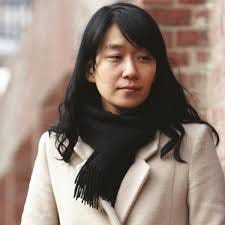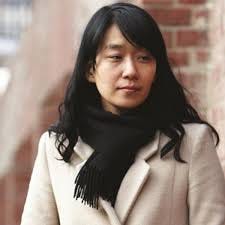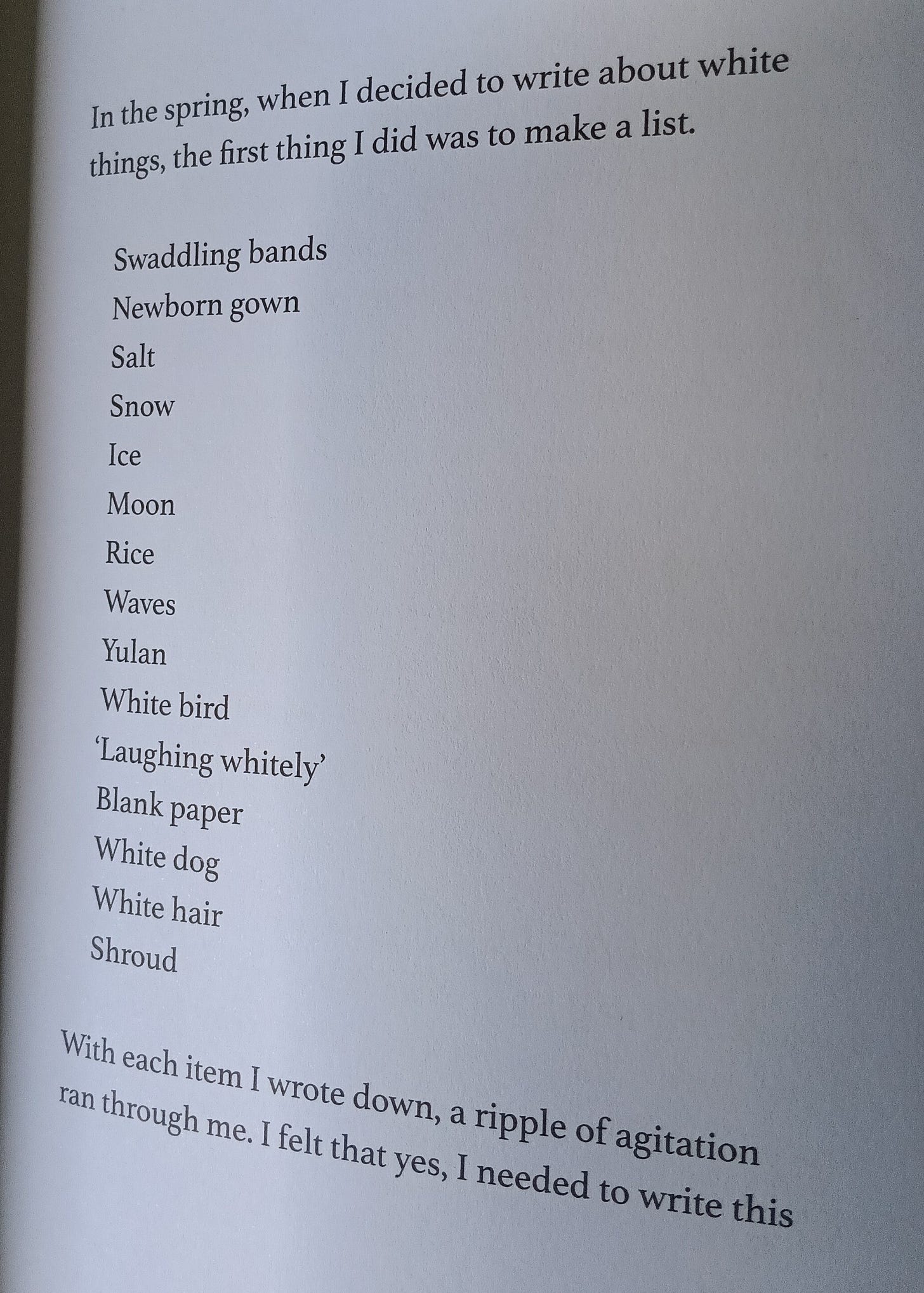2024 Nobel Prize Winner - Han Kang
The winner of the 2024 Nobel Prize in Literature is Han Kang.
Han Kang is a South Korean writer who was as surprised by the Swedish Academy’s honour as was most of the reading world. I had not seen her name on any list of predictions and am only discovering her work this morning.
But Han Kang is an excellent choice. It is a further sign that the Nobel Prize in Literature has entered a fertile period. The Prize is renewed as a portal to the living literature of the world.
Han Kang Biography
Han Kang was born in 1970 and grew up mostly in Seoul. She studied Korean literature at Yonsei University, and has published poetry and fiction, in short and long form, since her early twenties. Her father was also a novelist. Literature was her destiny.
But literature has not made Han Kang grandiose. She lives a modest life with her son in Seoul. She has suffered trauma, grief and migraines. She once disarmingly told a journalist that her illnesses had taught her humility. Moreover, she writes about historical traumas, including the violence suffered by Korea during Japanese occupation in the twentieth century. For this reason, the Nobel Committee awarded the Prize "for her intense poetic prose that confronts historical traumas and exposes the fragility of human life."
She has received many prizes, and so perhaps should be better known, at least by me. The best guide to her biography, acclaim and works is her own author website, so please check it out.
Han Kang Works
Han Kang’s major novels (check link for translation status) are:
Do Not Bid Farewell (2021)
The White Book (2016)
Human Acts (2014)
Greek Lessons (2011)
The Wind is Blowing (2010)
The Vegetarian (2017)
You can read a short essay on translating Human Acts here, and it gives a flavour of Han Kang’s poetically intense prose.
Her 2013 collection of poetry, I Put The Evening In The Drawer has not yet been translated into English.
The only text of Han Kang that I could get my hands on in the last 24 hours is The White Book. It is described as:
a meditation on colour. It is a book about mourning, rebirth and the tenacity of the human spirit. It is a stunning investigation of the fragility, beauty and strangeness of life.
It takes the form of short texts on white things. Many are less than a single page of text, and are presented with the conventions of poetry books. They are indeed prose poems, or poetically intensive autobiographical essays. For example, page 117 of The White Book presents seven lines on one experience of white.
Island of light
The moment she went up on stage, the ceiling spotlight flicked on, its strong beam picking her out. At that, all space that was not the stage became a sea of black. That an audience was sitting there seemed wholly unreal, and she was thrown into confusion. Do I go down into that ocean floor, step by faltering step, or stand my ground here in this island of light?
—Han Kang, The White Book
The White Book begins with this single page which recalls the genesis of the writing of the book.
I have merely sampled Han Kang’s writing, but already feel that rush of inspiration that drove her to write this genre-crossing book.
My reaction to the choice of Han Kang
The brief fragments of her prose and the glimpses into her personality provided in interviews suggest to me that Han Kang is an excellent choice for the Nobel Prize in Literature.
It is a further sign that the Nobel Prize in Literature has entered a fertile period. They have chosen an Asian woman still in the prime of her writing life. They have chosen a writer whose renown is not anchored in the Anglosphere. They have inducted another great ancient literary tradition, that of Korea, into the Nobel Hall of Fame. Korea has enjoyed something of a cultural surge over the last decade in culture, including film, television and now literature. The Academy has reopened the doors of Western culture to the living literature of the rest of the world. The tides of globalisation have turned even in the realm of culture.
I had predicted that the Swedish Academy would choose a woman writer from Asia. I had thought Geetanjali Shree might win, and there was betting plunge on the Australian Aboriginal Waanyi woman, Alexis Wright. I still think the under-representation of South Asian literature in the Nobel Prize is quite a scandal. But that can be rectified next year.
I encourage all readers of the Burning Archive to explore Han Kang’s writing over the next year. We will see more, better translations of her work published. Moreover, there is every sign that Han Kang will not be spoiled by the fame of the Nobel, in the way that some writers have been, as we have learned over the course of the 120 Nobels Challenge. In an interview in 2017, after the international fame garnered by The Vegetarian, she commented:
I’ve met more readers and a wider audience. But I wanted to recover my private life after a few months, because a lot of attention isn’t always good for a writer. It’s impossible to care about attention and still write.
—Han Kang, 2017
We can be confident that the spotlight of the Nobel will not blind this humble artist.
Reflections on the 120 Nobels Challenge
The 2024 announcement brings to an end my 120 Nobels Reading Challenge. Reading 120 - indeed now 121 - Nobel Laureates in 120 days was quite a challenge. But I did it!
I also wrote a post or made a video on all 120 Laureates. I hope you have enjoyed the fantastic journey we have travelled through the cultural history of the world.
I had three reflections on the 120 Nobels Challenge, and have made one decision that will help you dip into the challenge whenever you want.
The Challenge
It was a challenge for me! I may have bit off more than I could chew, but my hope is it reminded you of some old favourites or prompted you to explore a new writer or a new aspect of world literature and history. Next year, I promise any ‘challenges’ or participatory activities will be less taxing on you and me!
Discoveries
I discovered so many writers and rediscovered some old favourites. I have added many writers and books to my long to-read list, including Jaroslav Seifert, Nelly Sachs, Miguel Asturias, Quietly Flows the Don, Les Thibaults and so many more.
I even learned from readers and viewers about many of the loved writers from around the world who had a claim to win the Nobel Prize and never did. That list, however, is too long to do a repeat series on the writers the Swedish Academy rejected!
I also must express my eternal gratitude to poetry. If the Nobel Prize only went to writers of long novels, I would never have been able to complete this challenge. And I have shared poetry translated and with fragments in original languages of French, German, Swedish, Polish, Bengali, Italian, Russian and even Occitan. I hope you too have enjoyed discoveries and reminders of old favourites and dipped your toe into the multilingual poetic traditions of the world.
Window on the cultural history of the world
When I first conceived this challenge, I imagined posts with brief quotations taken from each writer. As I went along the history, context and unique stories of every writer led me to change direction. Over the course of the 120 days, paradoxically, this detour into literature became a return to the themes of the history of a changing, diverse, multipolar world. I hope you too have enjoyed this unique window on the cultural history of the world.
There are so many wonderful stories in the 120 Nobels Challenge I wanted to make them more accessible and a permanent feature of the Burning Archive.
Over the next few months I will migrate all my material together with new links and resources to a dedicated, curated page on the Nobel Prize. This treasure trove of books, writing and fantastic journeys through history will become a permanent feature of the Burning Archive.
The Nobel Archive will be an indexed guide to all Nobel Prizes in Literature, with posts, links, samples, and stories. Its initial version is live now and available for paid subscribers.
Coming up on the Burning Archive
Together with the establishment of the Nobel Archive, I am making some further refinements to my publication here on Substack.
Thanks for your feedback on my initial plans set out in my post, “Fantastic Journeys through History.” I have reflected on your comments. In the rest of this post, I am sharing with you the next version of my writing plans for 2025 and the rest of 2024.
What you get on the Burning Archive in 2025
In 2025 the Burning Archive will focus on three streams.
One, curated access to my complete archive, including the 121 Nobels
I will build two curated and easily navigated pages for all my content
Nobel Archive - an indexed guide to all Nobel Prizes in Literature, with posts, links, samples, and stories.
History’s Burning Archive - an indexed guide to all my history content (books, podcasts, articles and videos) since 2015 on topics ranging from America to Silk Worms (I could not recall if I had written on a topic starting with Z).
I will offer the curated archives as a special benefit for paid subscribers.
The basic version of the Nobel Archive is now live!
Two, weekly posts making sense of the changing world with history.
I will do a series throughout the year on the history, culture, social trends, and politics of the major powers and regions of the world.
These posts will include book recommendations and reflections on how we can live well and at peace in this one world.
These posts will explore how the tides of globalisation have changed - with the influence of USA and Europe subsiding, and that of China, India, South-East Asia, and other regions rising.
Three, quarterly read along of top books in history and world literature
I will offer read-along guides to four must-read books from world history and literature, including Olga Tokarczuk, The Books of Jacob
There will be short regular chapter summaries to make it easier for you to read these books too.
I will also offer exclusive commentary and guides for paid subscribers.
I will be providing more details of the 2025 program later in 2024.
Over the next three months, I will be introducing the new themes with posts on:
history of the post-1945 world, which we are leaving behind, based on John Darwin, After Tamerlane: the Rise and Fall of Global Empires 1400-2000, and
Introductions to writers who offer new ways of telling the story of the world, including Olga Tokarczuk.
Burning Archive Content Schedule - Rest of 2024
Over the next month, I will be travelling and limited in my ability to respond to your comments and notes. But please do comment and I will respond by early November.
But I have a full schedule of thoughtful posts prepared for you until the end of 2024.
Week starting 14 October
Monday (audio-mini) Olga Tokarczuk, The Tender Narrator (2018 Nobel Lecture)
Wednesday (exclusive post) How the tides of globalisation turned against the West part three
Saturday (open post) World crisis - defining the polycrisis
Week starting 21 October
Wednesday (exclusive post) Tokarczuk on history & The Books of Jacob
Saturday (open post) Empires and nations in a changing world
Week starting 28 October
Monday (audio-mini) Marina Tsvetaeva, The Poet and Time
Wednesday (exclusive post) Poets and history writers are émigrés
Saturday (open post) Empires and nations
Week starting 4 November
Wednesday (exclusive post) Post-1945 history of the multipolar world
Saturday (open post) Imagine a world free of the idea of nation
Week starting 11 November
Monday (audio-mini) Darwin, After Tamerlane, Audio Excerpt
Wednesday (exclusive post) After Tamerlane 1: The open post-1945 world
Saturday (open post) Post-1945 History Myths: America
Week starting 18 November
Wednesday (exclusive post) After Tamerlane 2: Cold War Partition of Europe
Saturday (open post) Post-1945 History Myths: Europe
Week starting 25 November
Monday (audio-mini) Rabindranath Tagore, Crisis in Civilization (1942)
Wednesday (exclusive post) After Tamerlane 3: Decolonisation
Saturday (open post) Post-1945 History Myths: China
Week starting 2 December
Wednesday (exclusive post) After Tamerlane 4: Empire Denied
Saturday (open post) Post-1945 History Myths: India
Week starting 9 December
Monday (audio-mini) Walter Benjamin, On the Concept of History (1940)
Wednesday (exclusive post) After Tamerlane 5: Unipolar World?
Saturday (open post) Post-1945 History Myths: Russia
Week starting 16 December
Wednesday (exclusive post) Looking back over the events of 2024
2025 on the Burning Archive
I hope this plan helps you know what to expect here at the Burning Archive. Please join me to search for new ways of telling the story of the world.





Interesting choice. I love The White Book (given to me by my daughter who lives in Seoul) and will look out for more of her work.
I'm reading Greek Lesson, and enjoying it. After reading James Joyce Han Kang is relatively easy, altho' somewhat odd, but I liked that.
I'm excited by the plans for the rest of 2024 and on into 2025. There is a great deal of fascinating material coming up.